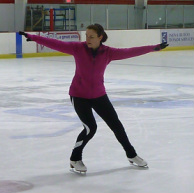|
Have you read the Sports section of your newspaper lately? I have. I do every day. I am always amazed by how much of what I read refers to mental aspects of a player's or team's performance.
Try it sometime. Read an article in that section and see if you can spot it. An athlete, a coach, the writer, inevitably someone mentions something about what is going on beyond the physical aspects of the sport performance. That's because the mind plays such a powerful role in ultimate behavior. The possibilities of success for an athlete who learns these techniques, and how and when to apply them, are endless. While you may not have heard specifically of "sport psychology" before, you have most certainly experienced it whether you knew it or not. That is why this is so exciting for me, and why I love what I do. I get to point out, put a name to, common sense that is not commonly applied. My clients inevitably experience that "a-ha moment" and there is a noticeable improvement in every aspect of their performance. Consider your own performance, be it in sport, business, or elsewhere. When you were successful, how did you feel? How did you prepare for a meeting, a presentation, a game? What went through your mind? When you made an error or even failed entirely, what thoughts appeared? Did you have a good talk with yourself? Replay what happened? Tell yourself you won't do it that way again? You were using mental techniques to affect physical behavior. Whoa! Breakthrough! We all are capable of great success and improvements in state of mind and behavior. The key is knowing which techniques are most effective, learning how to use them, and when to apply them. Back to the newspaper articles. Golf is in the headlines here in DC, as the AT&T National is in full swing (pun intended). Considering the actual physical effort in golf--swing, hit--takes mere seconds of the player's time, there is an awful lot of time out there when the player is left to think. In today's Washington Post, writer Barry Svrluga writes,"The walk from the ninth green to the 10th tee at Congressional Country Club cuts across the pristine practice green...There is, in those few hundred paces, a chance to think, be that productive or destructive." (emphasis added) Young golfer Jordan Spieth, just 19, felt he just needed "one break" to rebound from less stellar play. His outward appearance along the course reflected his inner voice. His shoulders slumping, eyes unfocused, he looked like a beaten man. "Maybe lost a couple of shots with my emotions there, which is upsetting," he says. He let some shots affect his thinking about future shots, a big liability in this or any game. On to London, where Wimbledon finished its opening week. Here we find more than just physical play at work for Serena Williams, number one seed. What could she have to think about when she is already so successful? Remember a rule of thumb in competition is to take each moment, each play, set, match, win for itself. Learn from it and move on. So for continued success, the mental training cannot end. "I feel like I try to play better as each match goes on," Williams said. "I try to find out something I can improve on from each match." From calming nerves to self-talk to refocusing to self-evaluation, ultimate performance depends not only on physical skill and strength, but on command and application of mental tools as well. The importance cannot be overstated. Still unsure? Open the Sports section, and read all about it.
0 Comments
|
"Even if you are on the right track, you will get run over if you just sit there." Personal Best SportsThe sports world is filled with stories of perseverance, failure and success, personal struggles and public triumph. Each story provides insight into the mental side of sport and activity. Archives
March 2016
Categories
All
|

